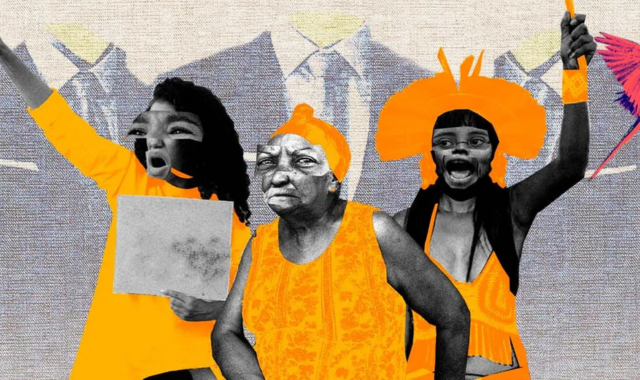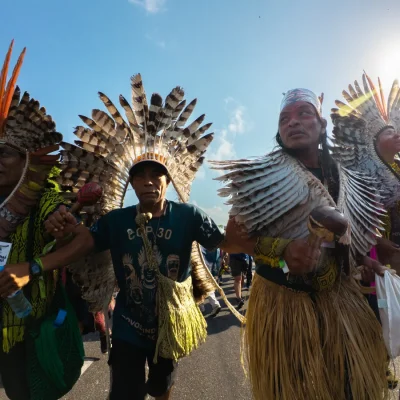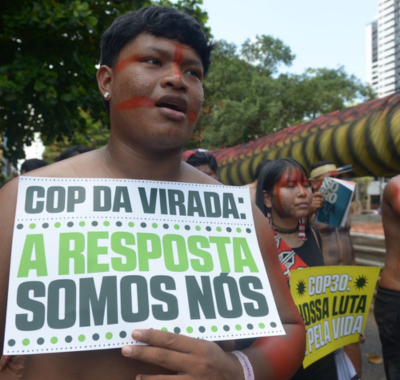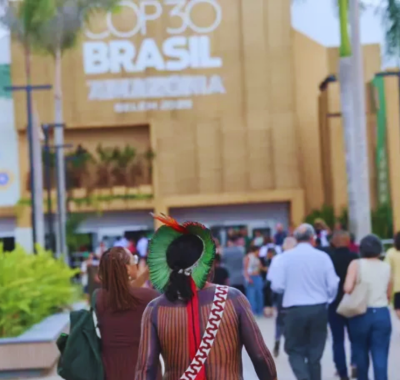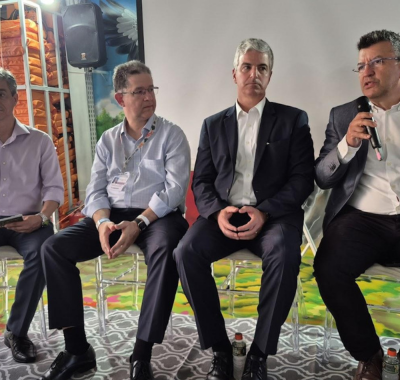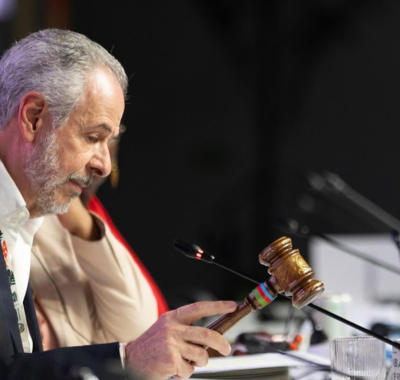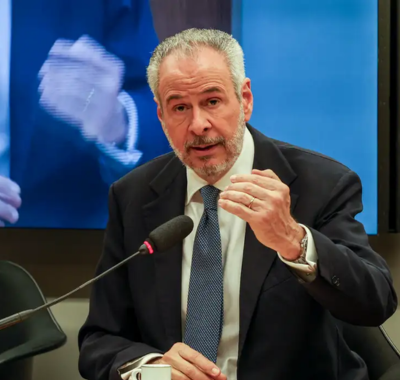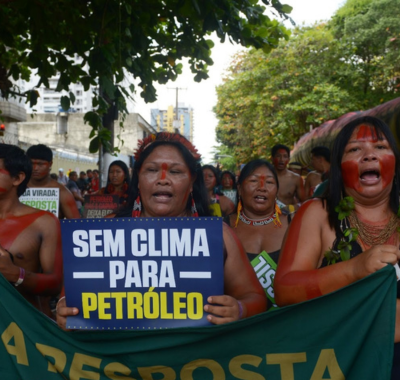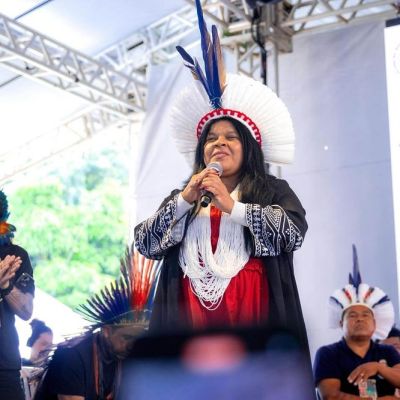The People’s Summit delivers a 15-point charter to the COP30 president and reaffirms that climate justice depends on feminist justice
By: Flávia Santos
Edited by: Jane Fernandes and Mariana Rosetti
Translated by Diego Lopes/Verso Tradutores
“We want a world with feminist justice,” calls the People’s Charter, a document produced by the People’s Summit, which brought together more than 23,000 accredited individuals between November 12 and 16 at the Federal University of Pará (UFPA). The document, which contains 15 points summarizing the demands of popular movements worldwide to address the climate crisis, was delivered to Ambassador André Corrêa do Lago, president of COP30.
This text is the result of a mobilization that began in 2024, bringing together social movements, Indigenous Peoples, quilombola communities, artisanal fishermen, and civil society organizations to press for effective political participation in climate discussions. While gender justice remains on the margins of official climate conference negotiations, as AzMina showed in this text, the story is different on the streets of Belém.
The final document was constructed during the conference, through six axes of convergence that guided the debates and assemblies throughout the week. One of them was specifically dedicated to “popular feminism and women’s resistance in the territories,” where it was discussed how the climate crisis impacts women’s lives differently and how they have been protagonists in the solutions built.
“Our bodies and territories are targets of attacks, but they are also spaces of care and strength. We are the ones who sustain life in the communities, who take care for the land, the water, the home, and the elders. To speak of climate justice is also to speak of gender, race, and territorial justice,” declared Ediene Kirixi, a leader of the Munduruku People, at one of the events of the People’s Summit.
The other five themes addressed living territories and food sovereignty; historical reparations and the fight against environmental racism; a just and inclusive transition; democracy and the internationalism of peoples; and just cities and urban peripheries.
Women in the letter
The People’s Charter was delivered to the COP ambassador on Sunday (17). In the introduction, the text addresses the reality of women and states that “peripheral communities are the most affected by extreme weather events and environmental racism” and face “a lack of justice and reparation actions, especially for women, young people, impoverished and non-white people.”
Environmental racism is the term used to describe how Black, Indigenous, and impoverished populations are disproportionately exposed to environmental risks—living closer to landfills, landslide areas, floodplains, and contaminated zones. Data shows that these communities are the ones that most often lose their homes, livelihoods, and, frequently, their lives when a climate disaster occurs.
In this context, women bear the additional burden of ensuring the survival of their families amidst the chaos. According to the 2022 Demographic Census, the population residing in favelas and urban communities in Brazil is 51.7% female.
Among the 15 demands, the ninth is entirely dedicated to care work, which is predominantly performed by women. “The work of reproducing life must be made visible, valued, understood for what it is—work—and shared within society as a whole and with the State.“ Furthermore, the letter emphasizes that women should not be held individually responsible for caregiving.
Not coincidentally, among those who report performing paid domestic and/or care work, 93.9% are women and only 6.1% are men, according to the Institute for Applied Economic Research (IPEA). The block concludes by saying: “We want a world with feminist justice, autonomy and participation of women.”
Throughout the document, the word “women” appears five times. In addition to the points mentioned, it appears in the list of groups that participated in the construction of the Summit, in the denunciation of the Palestinian genocide that primarily affects children, women, and the elderly, and again in the section on female autonomy and participation.
Issues that intersect with gender issues
The letter touches upon issues that intersect with gender discussions, even when it doesn’t explicitly name them. “There is no life without nature. There is no life without ethics and care work. That is why feminism is a central part of our political project ,” the document states.
Food sovereignty, for example, is one of the main points of the charter and is directly related to women’s lives. The concept is based on the premise that it is not enough to have sufficient food, but it is necessary to have control over how that food is produced, distributed, and consumed.
It is the peasant, Indigenous, and quilombola women who safeguard the heirloom seeds, maintain the traditional knowledge of planting and harvesting, and ensure the communities’ food supply. When the letter calls for “popular agrarian reform and the promotion of agroecology to guarantee food sovereignty,” it is directly addressing the work of these women.
A just transition is another term that appears prominently in the document. The proposal is not simply to replace fossil fuels with renewable sources while maintaining the same logic of exploitation. A just energy transition requires that workers and affected communities be the protagonists of the process and have their rights guaranteed.
Mobilization in the streets
The gender agenda was also present on the streets of Belém, the host city of COP30. Last Saturday (15), the Global March for Climate Justice brought together thousands of people. The demonstration brought together Indigenous Peoples, quilombolas, artisanal fishermen, students, trade unionists and activists from more than 60 countries.
Kirtana Chandrasekaran, executive director of Friends of The Earth International said she went to the march in solidarity with the thousands of people participating. “We know we are fighting against the same system. The capitalist, patriarchal, colonialist, and imperialist system that is causing the crisis we see today,” she commented.
On Sunday (16), the Summit held the “Banket-rally” in República Square, with free distribution of food to the population. The event, organized in partnership with food security movements, served meals prepared with food that would be discarded by fairs and supermarkets, but which was still fit for consumption.
The flotilla, a demonstration in boats, held on Wednesday (12), brought together Indigenous, quilombola, riverside, fishing and urban periphery women. They came from different places, but were united by the same agenda: to confront the climate crisis and the violence that crosses their bodies and territories. They recalled that there will be no climate justice as long as those who take care of water, forest and food remain outside the decision-making spaces.
Female ministers attend the delivery of the letter
Sônia Guajajara, Minister for Indigenous Peoples, and Marina Silva, Minister for the Environment and Climate Change, women who are leading figures in the Brazilian socio-environmental struggle, were present at the delivery of the letter.
“Democracy is built with the participation of the people, with listening and commitment” – Sônia Guajajara, Minister of Indigenous Peoples.
Marina Silva echoed President Lula’s statement that the Climate Conference in Belém is the COP of truth and implementation. According to the minister, “what has been done so far has not been enough, because the climate has already changed. What we are experiencing now is no longer an urgent matter; it is a climate emergency.”
The president of COP30, André Corrêa do Lago, pledged to bring the demands of the People’s Summit to the high-level meetings of the conference that will be held in this final week of negotiations. “It’s an extremely difficult negotiation. But knowing that global civil society has a voice in Belém is absolutely sensational,” he said.
In an interview with AzMina, Congresswoman Célia Xakriabá (Psol-MG), president of the Commission for the Defense of Women’s Rights in the Congress, reinforced that the People’s Charter will be brought to the table as a proposal. “Those who decide not to fully embrace the appeal of Indigenous Territories as a climate solution, and gender and climate as a climate solution, will have to assume responsibility as a consequence of being climate change deniers, but also deniers of our existence,” she concluded.
—
This report was produced by Azmina, through the Collaborative Socio-environmental Coverage of COP 30. Read the original report at: https://azmina.com.br/reportagens/fora-das-negociacoes-oficiais-genero-ganha-forca-nas-ruas-de-belem/?swcfpc=1

